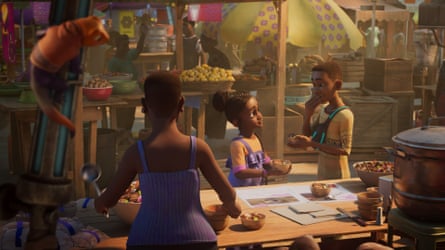Iwájú review – Disney steps into a bold and brilliant future
Afrofuturism emerged in the 1970s/80s as a way to express the African diaspora’s potential and present concerns. It used speculative technology, married to deeply rooted traditions, culture and aesthetics, to imagine a future founded in African ambition.
It appears in the novels of Octavia Butler, the vivid canvases of Jean-MichelBasquiat and the music of Missy Elliott, but its most famous iteration is Marvel’s Black Panther. The 2018 blockbuster featured the late Chadwick Boseman as the leader of a technologically advanced fictional African nation named Wakanda, a pan-African utopia complete with holograms, flying cars and citizens coordinating jade-green plate lips with exquisitely tailored three-piece suits.
The Disney+ series Iwájú (which means “the future” in the west African Yoruba language) is more specific in its Afrofuturism. It takes place in a future Lagos that has embraced the technological advancements while retaining a solid sense of Nigerian identity. The story follows young Tola (Simisola Gbadamosi), a girl from an affluent island suburb, who longs to connect with her father, a successful tech entrepreneur. Her dad is well intentioned but overstretched, having helped shape this new world. He believes “technology brings opportunity”; he has used AI and blockchain technology to try to eradicate crime and turn Lagos into a utopia.

But the city still has flaws; the opportunities have not extended across the entire landscape. Tola’s best friend, Kole (Siji Soetan), is a self-taught tech wunderkind, but he and his family struggle to make ends meet. To make matters more complicated, the most nefarious citizens of Lagos have embraced the innovations and are using, for example, gold-plated hover cars and sunglasses that show them a potential mark’s net worth to steal millions.
Tola’s father’s security company could help them make billions, though, as it holds enough information on the country’s elite to enable a widespread digital heist. So, Tola has to contend with coming of age while also fighting off a crew of ingenious criminal masterminds.
If that sounds a little much in terms of world-building and plot for six 20-minute episodes, that’s because it is. For all that Iwájú is delightful, it is also frantically paced and hard to follow. Allegiances and relationships shift continually, while keeping up with the many pieces of technology would require fastidious note-taking.
The best way to take in this miniseries is with a shallow focus – by enjoying the vibrant, jewel-toned animation, the Afrobeats soundtrack and the wonderful Nigerian voice cast, who can even make exposition about blockchain sing. At a time when Disney’s Marvel properties are failing to deliver critically and financially and the animated cinematic slate has been criticised for relying too heavily on sequels and spin-offs, the streaming output of Disney+ has shown ingenuity and a global outlook. Iwájú’s Lagos joins Black Cake’s depiction of mid-century Caribbean life and Shōgun’s medieval Japan as one of the most beautiful landscapes on television.
after newsletter promotion
There is a refreshing specificity to this Lagos in the food, architecture and intricately embroidered agbadas that billow in the wind. The team behind it – the comic-book entertainment company Kugali – has pan-African and British roots, but the show never journeys beyond Lagos’s city limits. It is bold for Disney+, which is not available in Nigeria, to presume that non-Nigerian audiences will invest in our young Yoruba protagonist. Still, even if you don’t know your suya from your puff-puffs, there are plenty of universal themes – self-identity, family, independence – to grab on to, plus an adorable pet lizard sidekick.
Audiences that don’t know what a blockchain is (seriously, please explain to me what a blockchain is), or how digital heists might work in this age of cybersecurity and surveillance, will be left none the wiser. But the show illuminates parts of Nigerian identity that are rarely celebrated on a global stage. It is an unashamedly optimistic look at the country’s future and a celebration of the diaspora’s talents. There is so much untapped potential when it comes to telling stories about Africa’s past, present and prospects. While Iwájú is featherlight fun for all the family, it is also an encouraging step into a bold and brilliant future.
Original Source
